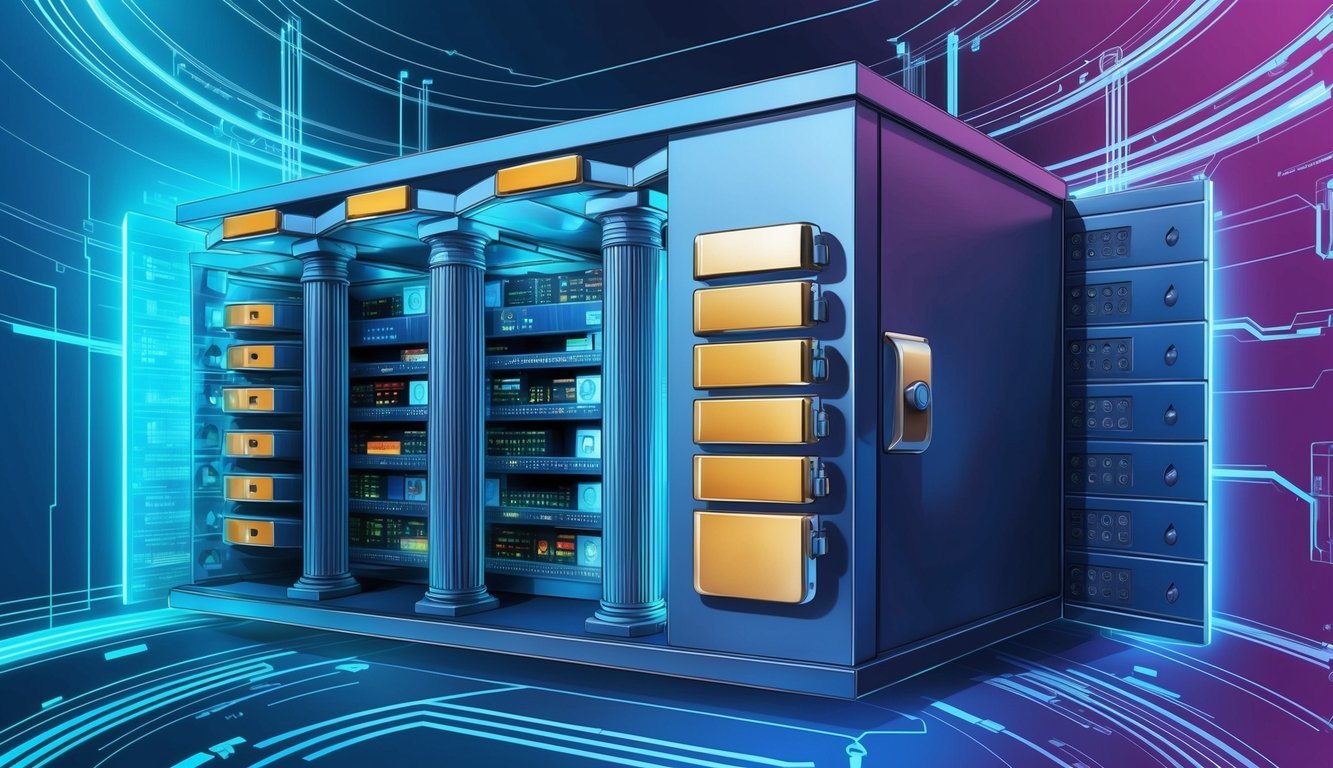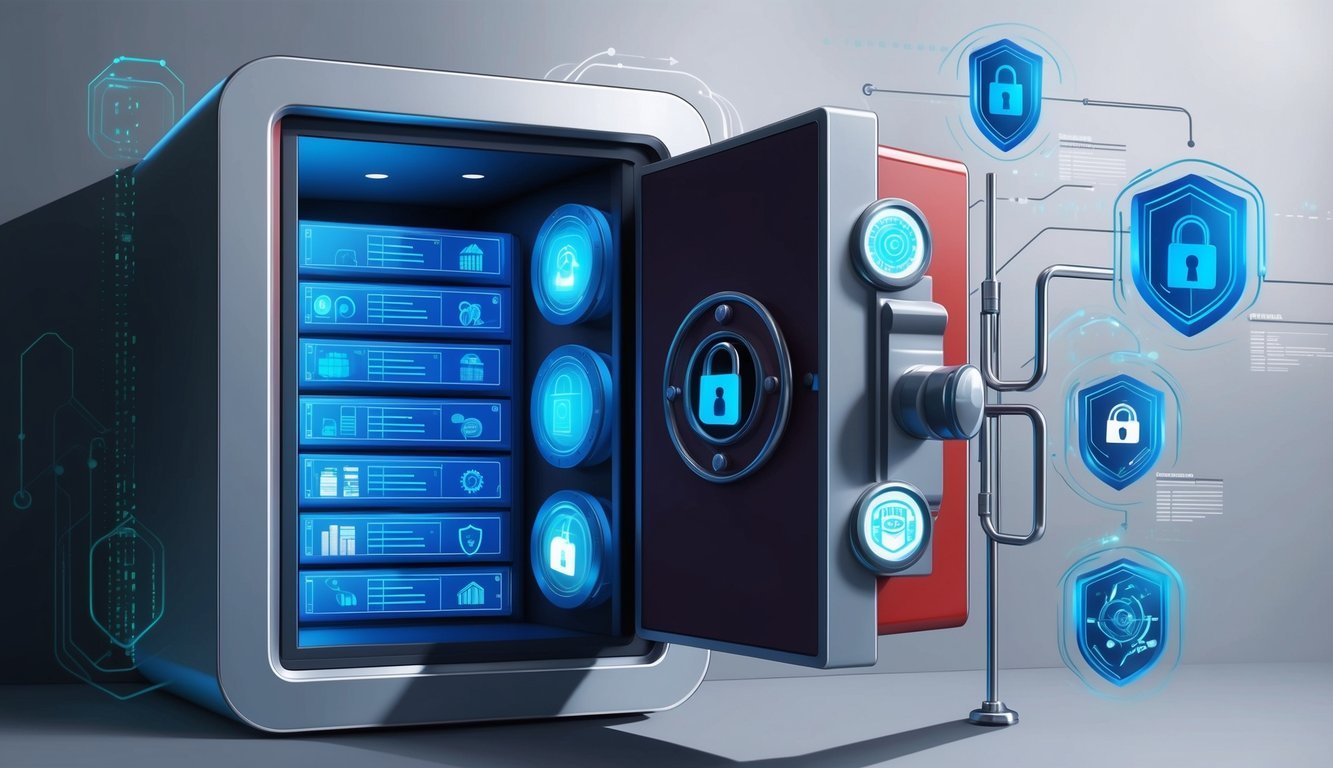Digital asset custody is a hot topic in the crypto world. It’s all about keeping your digital money safe. Think of it like a super-secure digital piggy bank for your Bitcoin and other cryptocurrencies.

Digital asset custody is the practice of storing and protecting digital assets on behalf of their owners.
It’s not just about having a fancy password. Custodians use advanced tech to guard your crypto from hackers and thieves. They’re like the Fort Knox of the digital realm.As more people and big companies get into crypto, good custody solutions are becoming a big deal. You want to make sure your digital gold is locked up tight, right? That’s where custodians come in. They’re working hard to make sure your assets are safe and sound, even as the crypto world keeps changing.
Key Takeaways
- Digital asset custody keeps your crypto safe using advanced security measures
- Custodians are crucial for big investors and companies getting into crypto
- The field is always evolving with new tech to protect digital assets better
Key Components of Digital Asset Custody
Digital asset custody involves several crucial elements that work together to keep your crypto safe. These include the custodians themselves, the keys that control access, and the wallets where assets are stored.
Custodians and Their Role
Custodians are the guardians of your digital assets. They’re usually financial institutions or specialized companies that offer custody services. Their job? To keep your crypto safe and sound.
When you use a custodian, you’re trusting them with your assets. They use advanced security measures to protect your holdings. This can include things like:
- Multi-signature approvals
- Cold storage (offline storage)
- Insurance against theft or loss
Custodians are especially popular with big investors and companies. They offer peace of mind and often make it easier to follow rules and regulations.
Understanding Private and Public Keys
Keys are like the passwords to your crypto kingdom. There are two types: private and public.
Your public key is like your email address. You can share it with others so they can send you crypto. It’s safe to give out.
Your private key is different. It’s super secret – like the password to your email. With it, you can:
- Access your funds
- Make transactions
- Prove ownership of your assets
Private key management is crucial in digital asset custody. If someone gets your private key, they can take your crypto. That’s why custodians use special tech to keep these keys safe.
The Significance of Wallets
Wallets are where you store your digital assets. They come in different types:
- Hot wallets: Connected to the internet. Quick and easy to use, but less secure.
- Cold wallets: Offline storage. Much safer, but not as convenient.
- Hardware wallets: Physical devices that store your keys offline.
Custodians often use a mix of hot and cold storage. They might keep a small amount in hot wallets for quick transactions. The rest stays in super-secure cold storage.
Your choice of wallet depends on your needs. If you trade often, you might use a hot wallet. For long-term holding, cold storage is usually safer. Many people use a mix of both.
Security and Protection Strategies
Keeping your digital assets safe is super important. You need strong security measures, good insurance, and careful attention to rules and regulations.
Combating Security Breaches
You’ve got to stay one step ahead of the bad guys. Custody providers use advanced security measures to protect your crypto. Things like:
- Multi-factor authentication
- Cold storage (offline wallets)
- Encryption
- Regular security audits
But remember, you play a role too! Use strong passwords and be careful about phishing scams. It’s a team effort to keep your digital assets safe.
Some cool tech is making security even better. Private blockchains can add an extra layer of protection. They’re like a special club – only approved members can join.
Insurance and Risk Management
Let’s face it, stuff happens. That’s why insurance is key in the crypto world. Many custody providers offer insurance to cover losses from:
- Hacks
- Theft
- Employee misconduct
But don’t assume you’re fully covered! Read the fine print. Some policies have limits or exclusions.
Risk management goes beyond insurance. You should:
- Spread your assets across different wallets
- Use trusted exchanges
- Keep most of your crypto in cold storage
Think of it like not keeping all your eggs in one basket. It’s a smart way to protect your digital wealth.
Compliance with Regulations
Rules, rules, rules! The crypto world has plenty. Staying compliant keeps you out of trouble and helps protect your assets. Key things to know:
- AML (Anti-Money Laundering) rules
- KYC (Know Your Customer) requirements
- Tax reporting obligations
These rules can be tricky. They often change and vary by country. Good custody providers stay on top of regulations. They help make sure you’re following the law.
Remember, compliance isn’t just about avoiding fines. It helps keep the whole crypto ecosystem safer for everyone. Plus, it makes digital assets more legit in the eyes of traditional finance.
Investor Considerations in Digital Asset Custody

When you’re thinking about digital asset custody, there are some key things to keep in mind. You’ll want to focus on how your assets are kept separate and managed, as well as how easily you can access and control them.
Asset Segregation and Management
Digital asset custody is all about keeping your crypto safe. You should check if the custodian keeps your assets separate from others. This helps protect your holdings if something goes wrong.
Look into how they manage your assets too. Some custodians offer cool features like staking. This lets you earn rewards on your digital holdings.
Ask about their security measures. Do they use cold storage? How often can you withdraw? These details matter for your peace of mind.
Remember, different custodians have different rules. Make sure you’re comfy with how they handle your stuff.
Access and Ease of Asset Management
You want your digital assets to be safe, but also easy to use when you need them. Check how quickly you can access your funds. Can you trade or move assets 24/7?
Some custodians offer user-friendly apps or websites. These can make managing your digital holdings a breeze. You might be able to see all your assets in one place.
Think about what you need. If you’re an institutional client or family office, you might want more advanced tools. Look for features that fit your style.
Don’t forget about customer support. Good help can make a big difference when you’re dealing with digital assets.
Innovations and Emerging Trends
The digital asset custody landscape is changing fast. New tech and assets are shaking things up. Let’s check out what’s hot right now.
Blockchain Technology Advancements
Blockchain keeps getting better. You’ll see faster and more secure networks popping up. Multi-party computation (MPC) is a big deal now. It splits up private keys to boost security.
Some blockchains are working on scaling. They want to handle more transactions quickly. This could make digital assets more useful in everyday life.
Watch out for new ways to store tokens safely. Cold storage is getting cooler. Hardware wallets are tougher to crack.
Growth of NFTs and Stablecoins
NFTs are blowing up. They’re not just for art anymore. You might see NFTs used for real estate or even concert tickets.
Stablecoins are gaining ground too. They offer a steady value in the wild crypto world. Big companies and even some countries are looking into them.
These new assets need special care. Custody services are adapting fast. They’re figuring out how to keep your digital goodies safe and sound.
Remember, this space moves quick. What’s cutting-edge today might be old news tomorrow. Keep your eyes peeled for the next big thing in digital asset custody.
Frequently Asked Questions

Digital asset custody involves keeping crypto safe and managing it properly. Let’s tackle some common questions about how it all works and who’s involved.
What’s the deal with holding digital assets anyway?
Holding digital assets is tricky. They’re not physical, so you can’t just stick them in a safe. Instead, you need special tools to store and protect them from hackers and thieves.
It’s like having a super-secure digital wallet. But if you lose the keys to this wallet, your assets are gone for good. That’s why custody services are so important.
How’s digital asset management actually go down?
Digital asset management uses tech to keep your crypto safe. It’s not just about storage – it’s also about being able to use your assets when you need to.
Some services use cold storage, which keeps assets offline. Others use hot wallets for quick access. The best options blend security with usability.
Who are the big players in the digital asset custody game?
There are a few types of players in this field. Traditional banks are getting into it, but there are also crypto-native companies.
Fidelity Digital Assets is an example of a big name in finance offering custody. Coinbase Custody and BitGo are crypto-focused options.
How do individual folks keep their crypto safe with custody services?
As an individual, you’ve got options. Some people use hardware wallets to store their own keys. Others trust exchanges or custody providers.
The key is picking a method that fits your needs. If you’re trading often, a custodial exchange might work. For long-term holding, a hardware wallet could be better.
So, how massive is the market for digital asset custody these days?
The digital asset custody market is huge and growing. In 2021, the total value of digital assets hit over two trillion dollars.
This growth attracts more players to the custody game. It also means more attention to security and regulation in the industry.
Can you break down the main types of digital assets we keep hearing about?
Sure thing! The most famous digital asset is Bitcoin. But there’s a whole world beyond that.
You’ve got other cryptocurrencies like Ethereum, stablecoins pegged to real-world currencies, and tokens used in decentralized finance. Some digital assets even represent ownership in real-world items. These diverse forms of cryptocurrency are reshaping the financial landscape, providing users with new opportunities for investment and value exchange. Understanding stablecoins in digital finance is crucial, as they offer a bridge between the volatile nature of cryptocurrencies and the stability of traditional currencies. By maintaining a fixed value, stablecoins can facilitate transactions and reduce the risks associated with price fluctuations, making them a vital component in the ever-evolving world of digital assets.





